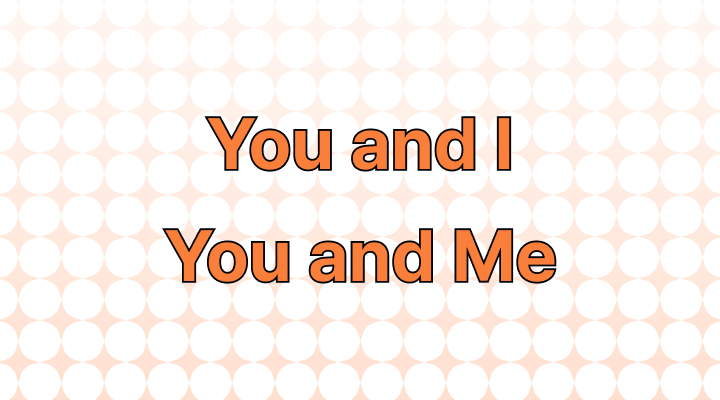"You and I" refers to both the speaker and another person(s) and is used as the subjects of sentences or clauses. "You and me" also refers to both the speaker and another person(s) but is used as the objects of sentences or clauses.
In the world of grammar, pronouns are the workhorses that help us communicate efficiently. However, deciding whether to use "you and I" or "you and me" in a sentence can sometimes feel like navigating a grammatical maze. To clear up the confusion, let's dive into the meanings, differences, and correct usage of these pronoun pairs.
What does "You and I" mean?
"You and I" is a pronoun combination used to refer to two or more people. In this pairing, both "you" and "I" serve as subject pronouns, implying that both individuals are the subjects of the sentence or clause.
Example Scenario:
- "You and I are going to the store."
In this sentence, "you and I" are both subjects of the verb "are going," making the use of subject pronouns ("you" and "I") appropriate.
What does "You and Me" mean?
"You and me" is a pronoun combination also used to refer to two or more people. However, in this case, "you" is the second person pronoun (referring to the person being spoken to), while "me" is the first person pronoun (referring to the speaker). This combination emphasizes the speaker ("me") and the person being addressed ("you") as the objects of the sentence.
Example Scenario:
- "They invited you and me to the party."
In this example, "you and me" are the direct objects of the verb "invited," so the use of the objective case pronoun "me" is appropriate.
Differentiating "You and I" from "You and Me"
The distinction between "you and I" and "you and me" hinges on their roles within a sentence:
"You and I" is used when the pronoun pair serves as the subject of the sentence or a clause. In these cases, both "you" and "I" are subject pronouns.
"You and me" is employed when the pronoun pair serves as an object (e.g., direct object, indirect object, or object of a preposition) in the sentence. Here, "me" is the objective case pronoun.
Common Idioms/Phrases
While "you and me" and "you and I" are not idiomatic expressions themselves, they often appear within idiomatic phrases or sentences. Here are a couple of examples:
"Between you and me": This phrase is used to discreetly share confidential information or secrets.
- Example: "Between you and me, I think she's planning a surprise party."
"Let's keep this between you and me": A variation of the previous phrase, emphasizing confidentiality.
- Example: "Let's keep this between you and me; I don't want others to know yet."
Practice Questions
- ____________ are responsible for this project.
- They want to meet ____________ at the café.
- ____________ will present the proposal to the committee.
Answer Key:
- You and I
- you and me
- You and I
Mastery of "you and I" and "you and me" ensures your sentences are grammatically correct and effectively convey your intended meaning. Whether you're discussing plans, sharing secrets, or simply having a conversation, selecting the right pronoun pair is crucial for clear communication.
Want to sound like a native speaker?
Engram’s AI-powered grammar checker makes your English sound like a native speaker’s, suggesting natural English expressions on top of fixing grammar, spelling, punctuation, word order, and vocabulary.

Reference













